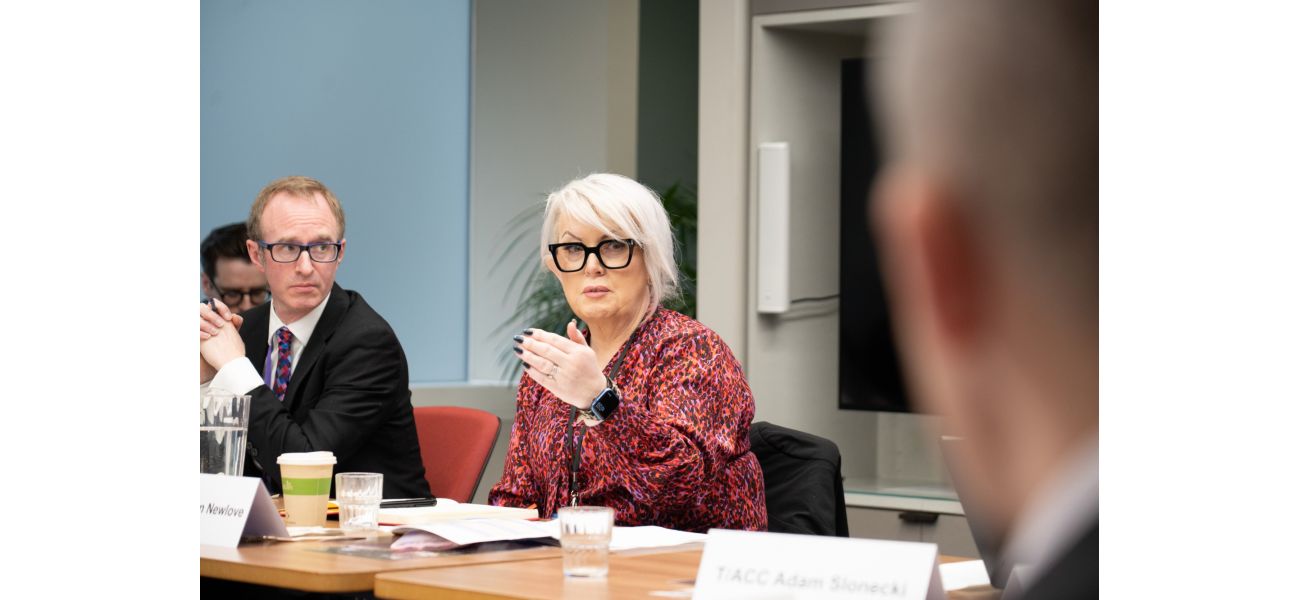Survivors of rape are suffering from the high cost of seeking justice.
Adult rape cases usually take about 424 days to go from charging to resolution in court.
December 11th 2024.

As the Victims’ Commissioner, my primary goal is to advocate for change in the criminal justice system. Violence against women and girls is a global crisis of immense proportions, and here in the UK, we are facing our own deepening epidemic of VAWG. In fact, VAWG-related offences now make up 20% of all police recorded crimes. This crisis requires bold and decisive action.
To effectively tackle this epidemic, we must begin by understanding the realities faced by victims as they navigate the criminal justice system. As the Victims’ Commissioner, I am committed to listening to victims and their concerns, and understanding why many are hesitant to come forward in the first place. I see the pressing need to transform how victims perceive and experience our criminal justice system and the agencies that support it.
The experience of rape victims, in particular, highlights the urgent need for change within our system. That is why, on November 25, 2024, Metro launched our year-long campaign, This Is Not Right, to address the relentless epidemic of violence against women. Throughout the year, we will be sharing stories that shed light on the magnitude of this issue. With the support of our partners at Women's Aid, our aim is to engage and empower our readers to take action against violence against women. We invite our readers to share their own stories with us via email.
Navigating the criminal justice system can be daunting for any victim, but it becomes even more challenging for rape victims. They may face intrusive scrutiny of their behavior and personal history, as well as intimidating cross-examination that perpetuates rape myths and victim-blaming. On top of that, the backlog of cases in our Crown Courts leads to record-long waiting times for justice. In fact, it takes an average of 424 days for an adult rape case to progress from the decision to charge through to conclusion in court. And this does not even include the time taken for the preceding police investigation.
According to Rape Crisis, 6.5 million women in England and Wales have been raped or sexually assaulted, yet only 1 in 6 women report it. The number of sexual offences in England and Wales has reached a record high, and research has shown that rape offences have the highest not guilty plea rate of any offence. Shockingly, almost half of all rapes are committed by a victim's partner or ex-partner, and in 85% of cases, the victim knows the perpetrator. Furthermore, more than 1 in 5 victims were unconscious or asleep when they were raped.
These delays in the justice system have devastating consequences for victims. In fact, in Rape Crisis' Breaking Point report, survivors shared that the prolonged process left them feeling suicidal. With such lengthy delays, many victims may feel they cannot endure the process and may withdraw their support for prosecution. This not only harms the victim but also society as a whole, as justice is not served.
Some victims even disclosed that they attempted to take their own lives due to the delays. These delays are not just bureaucratic; they have life-altering effects and leave lasting impacts on those seeking justice. It is no surprise that this past year saw a 41% increase in the number of rape victims withdrawing their support at the prosecution stage compared to the previous year.
As the Victims’ Commissioner, I will continue to advocate for change because this is not right. We cannot allow these delays and injustices to continue. It is time for bold and decisive action to transform our criminal justice system and ensure that victims of violence against women and girls receive the justice they deserve.
As the Victims’ Commissioner, my role is to advocate for change and raise awareness about the global crisis of violence against women and girls. This is not just a problem in the UK, but a staggering epidemic that demands bold and decisive action. In fact, VAWG-related offences now account for 20% of all police recorded crime in the UK, highlighting the urgent need for change in how we approach this issue.
To effectively tackle this epidemic, we must start by listening to and understanding the lived realities of victims navigating the criminal justice system. As a result, I will continue to advocate for change because I see the pressing need to transform how victims perceive and experience our system and the agencies that support it.
One particular area that needs improvement is the experience of rape victims within our criminal justice system. This highlights the need for our year-long campaign, This Is Not Right, which launched on November 25, 2024. Throughout the year, we will share stories that shed light on the scale of this epidemic and work with our partners at Women's Aid to engage and empower our readers on this pressing issue. We also encourage victims to share their stories with us through email.
For many victims, navigating the criminal justice system can be intimidating, but rape victims face unique challenges. This can include invasive scrutiny of their behavior and personal history, as well as cross-examinations riddled with rape myths, misconceptions, and victim-blaming. These challenges, coupled with the backlog of cases in our courts, result in record-long waits for justice. On average, it takes 424 days for an adult rape case to progress from the decision to charge to the conclusion in court. This excludes the time taken for the preceding police investigation.
It is important to note that this is just the average and does not account for the devastating impact these delays have on victims. According to Rape Crisis, 6.5 million women in England and Wales have been raped or sexually assaulted, but only 1 in 6 women report these crimes. Additionally, the number of sexual offences reached a record high in 2022, and research shows that rape offences have the highest not guilty plea rate of any offence. Furthermore, the majority of rape victims know their perpetrator, and a significant number are unconscious or asleep when the assault occurs.
These delays not only have a profound impact on the victim's mental health, with some survivors reporting suicidal thoughts, but also on society as a whole. This is evident in the fact that a fifth of adult rape cases were stopped because the victim no longer supported the prosecution. These delays are not just administrative; they have lasting and life-altering consequences for those seeking justice. In fact, this past year saw a 41% increase in the number of rape victims who withdrew from the prosecution compared to the previous year.
As we continue to advocate for change and raise awareness about this crisis, let us remember the devastating impact it has on victims and the urgent need for bold and decisive action. Together, we can work towards a future where victims feel supported and heard within our criminal justice system.
To effectively tackle this epidemic, we must begin by understanding the realities faced by victims as they navigate the criminal justice system. As the Victims’ Commissioner, I am committed to listening to victims and their concerns, and understanding why many are hesitant to come forward in the first place. I see the pressing need to transform how victims perceive and experience our criminal justice system and the agencies that support it.
The experience of rape victims, in particular, highlights the urgent need for change within our system. That is why, on November 25, 2024, Metro launched our year-long campaign, This Is Not Right, to address the relentless epidemic of violence against women. Throughout the year, we will be sharing stories that shed light on the magnitude of this issue. With the support of our partners at Women's Aid, our aim is to engage and empower our readers to take action against violence against women. We invite our readers to share their own stories with us via email.
Navigating the criminal justice system can be daunting for any victim, but it becomes even more challenging for rape victims. They may face intrusive scrutiny of their behavior and personal history, as well as intimidating cross-examination that perpetuates rape myths and victim-blaming. On top of that, the backlog of cases in our Crown Courts leads to record-long waiting times for justice. In fact, it takes an average of 424 days for an adult rape case to progress from the decision to charge through to conclusion in court. And this does not even include the time taken for the preceding police investigation.
According to Rape Crisis, 6.5 million women in England and Wales have been raped or sexually assaulted, yet only 1 in 6 women report it. The number of sexual offences in England and Wales has reached a record high, and research has shown that rape offences have the highest not guilty plea rate of any offence. Shockingly, almost half of all rapes are committed by a victim's partner or ex-partner, and in 85% of cases, the victim knows the perpetrator. Furthermore, more than 1 in 5 victims were unconscious or asleep when they were raped.
These delays in the justice system have devastating consequences for victims. In fact, in Rape Crisis' Breaking Point report, survivors shared that the prolonged process left them feeling suicidal. With such lengthy delays, many victims may feel they cannot endure the process and may withdraw their support for prosecution. This not only harms the victim but also society as a whole, as justice is not served.
Some victims even disclosed that they attempted to take their own lives due to the delays. These delays are not just bureaucratic; they have life-altering effects and leave lasting impacts on those seeking justice. It is no surprise that this past year saw a 41% increase in the number of rape victims withdrawing their support at the prosecution stage compared to the previous year.
As the Victims’ Commissioner, I will continue to advocate for change because this is not right. We cannot allow these delays and injustices to continue. It is time for bold and decisive action to transform our criminal justice system and ensure that victims of violence against women and girls receive the justice they deserve.
As the Victims’ Commissioner, my role is to advocate for change and raise awareness about the global crisis of violence against women and girls. This is not just a problem in the UK, but a staggering epidemic that demands bold and decisive action. In fact, VAWG-related offences now account for 20% of all police recorded crime in the UK, highlighting the urgent need for change in how we approach this issue.
To effectively tackle this epidemic, we must start by listening to and understanding the lived realities of victims navigating the criminal justice system. As a result, I will continue to advocate for change because I see the pressing need to transform how victims perceive and experience our system and the agencies that support it.
One particular area that needs improvement is the experience of rape victims within our criminal justice system. This highlights the need for our year-long campaign, This Is Not Right, which launched on November 25, 2024. Throughout the year, we will share stories that shed light on the scale of this epidemic and work with our partners at Women's Aid to engage and empower our readers on this pressing issue. We also encourage victims to share their stories with us through email.
For many victims, navigating the criminal justice system can be intimidating, but rape victims face unique challenges. This can include invasive scrutiny of their behavior and personal history, as well as cross-examinations riddled with rape myths, misconceptions, and victim-blaming. These challenges, coupled with the backlog of cases in our courts, result in record-long waits for justice. On average, it takes 424 days for an adult rape case to progress from the decision to charge to the conclusion in court. This excludes the time taken for the preceding police investigation.
It is important to note that this is just the average and does not account for the devastating impact these delays have on victims. According to Rape Crisis, 6.5 million women in England and Wales have been raped or sexually assaulted, but only 1 in 6 women report these crimes. Additionally, the number of sexual offences reached a record high in 2022, and research shows that rape offences have the highest not guilty plea rate of any offence. Furthermore, the majority of rape victims know their perpetrator, and a significant number are unconscious or asleep when the assault occurs.
These delays not only have a profound impact on the victim's mental health, with some survivors reporting suicidal thoughts, but also on society as a whole. This is evident in the fact that a fifth of adult rape cases were stopped because the victim no longer supported the prosecution. These delays are not just administrative; they have lasting and life-altering consequences for those seeking justice. In fact, this past year saw a 41% increase in the number of rape victims who withdrew from the prosecution compared to the previous year.
As we continue to advocate for change and raise awareness about this crisis, let us remember the devastating impact it has on victims and the urgent need for bold and decisive action. Together, we can work towards a future where victims feel supported and heard within our criminal justice system.
[This article has been trending online recently and has been generated with AI. Your feed is customized.]
[Generative AI is experimental.]
0
0
Submit Comment




